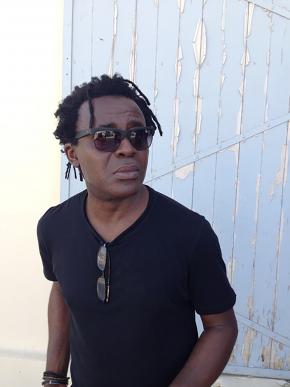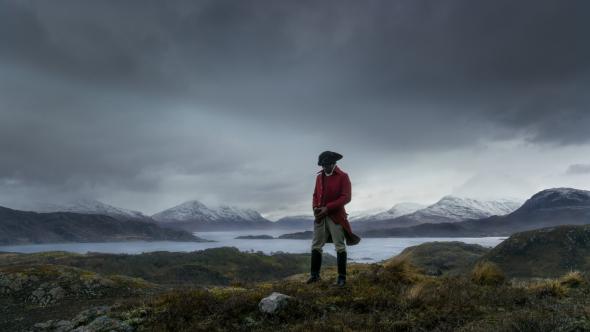John Akomfrah à conversa com Manuela Ribeiro Sanches
dia 9 de novembro, 18h30 no Hangar – Centro de Investigação Artística, Lisboa
 Retrato de John Akomfrah @ Smoking Dogs Films. Cortesia Smoking Dogs Films.John Akomfrah estará à conversa com Manuela Ribeiro Sanches, pela ocasião da sua exposição individual ‘Purple’ no Museu Coleção Berardo em Lisboa. Olhando tanto para obras anteriores como mais recentes, a conversa versará sobre o envolvimento estético e ético-político de várias décadas de Akomfrah com as histórias e as memórias da escravatura, do colonialismo e do anti-colonialismo; as formações diaspóricas pós-coloniais; e as intersecções do racismo, do capitalismo e da destruição ambiental.
Retrato de John Akomfrah @ Smoking Dogs Films. Cortesia Smoking Dogs Films.John Akomfrah estará à conversa com Manuela Ribeiro Sanches, pela ocasião da sua exposição individual ‘Purple’ no Museu Coleção Berardo em Lisboa. Olhando tanto para obras anteriores como mais recentes, a conversa versará sobre o envolvimento estético e ético-político de várias décadas de Akomfrah com as histórias e as memórias da escravatura, do colonialismo e do anti-colonialismo; as formações diaspóricas pós-coloniais; e as intersecções do racismo, do capitalismo e da destruição ambiental.
John Akomfrah (1957, Acra, Gana) vive e trabalha em Londres. É um artista e cineasta enormemente respeitado, cujas obras se caracterizam pelas suas investigações sobre memória, pós-colonialismo, temporalidade e estética e, com frequência, exploram a experiência da diáspora africana na Europa e nos EUA. Akomfrah foi um membro fundador do influente Black Audio Film Collective, que surgiu em Londres em 1982, juntamente com os artistas David Lawson e Lina Gopaul, com quem ainda hoje colabora. O seu primeiro filme, ‘Handsworth Songs’ (1986), explorou os eventos em torno dos protestos de 1985 em Birmingham e Londres, através de uma combinação densa de material fílmico de arquivo, fotografias e notícias. O filme ganhou vários prémios internacionais e configurou um estilo visual multifacetado que se tornou paradigmático da prática de Akomfrah. Obras recentes incluem a instalação em três écrans ‘The Unfinished Conversation’ (2012), um retrato emotivo da vida e do trabalho do teórico cultural Stuart Hall; ‘Peripeteia’ (2012), um drama imaginado que visualiza as vidas dos indivíduos incluídos em dois retratos do século XVI de Albrecht Dürer; e ‘Mnemosyne’ (2010), que expõe a experiência dos migrantes no Reino Unido, questionando a noção de que a Grã-Bretanha é uma terra prometida ao revelar as realidades da dificuldade económica e do racismo casual. Em 2015, Akomfrah estreou a sua instalação em três écrans ‘Vertigo Sea’ (2015), que explora o que Ralph Waldo Emerson chama de ‘os mares sublimes’. Fundindo material de arquivo, leituras de fontes clássicas e imagens novas, a obra de Akomfrah foca-se na desordem e na crueldade da indústria baleeira, a que justapõe cenas das muitas gerações de migrantes que atravessaram epicamente o oceano em busca de uma vida melhor. Em 2017, Akomfrah mostrou ‘Purple’, uma imersiva instalação vídeo em seis canais, que aborda as alterações climáticas e os seus efeitos nas comunidades humanas, na biodiversidade e na natureza. Mais recentemente, Akomfrah estreou ‘Precarity’ na Prospect 4 New Orleans. Através de material de arquivo e de imagens novas, ‘Precarity’ segue a vida do esquecido cantor de jazz de Nova Orleães, Buddy Bolden.
Akomfrah teve inúmeras exposições individuais, incluindo: New Museum, Nova Iorque, EUA (2018); Bildmuseet, Umeå, Suécia (2018); Nasher Museum of Art na Duke University, Durham, NC, EUA (2018); SFMOMA, São Francisco, CA, EUA (2018); Museo Thyssen-Bornemisza, Madrid, Espanha (2018); Barbican, Londres, Reino Unido (2017); Whitworth Art Gallery, Manchester, Reino Unido (2017); University of New South Wales, Paddington, Austrália (2016); Turner Contemporary, Margate, Reino Unido (2016); The Exchange, Penzance, Reino Unido (2016); Nikolaj Kunsthal, Copenhaga, Dinamarca (2016); STUK Kunstcentrum, Lovaina, Bélgica (2016); Arnolfini, Bristol, Reino Unido (2016); Bildmuseet, Umeå, Suécia (2015); Eli and Edythe Broad Art Museum, Michigan, EUA (2014); Tate Britain, Londres, Reino Unido (2013-14); e uma série de projecções ao longo de uma semana no MoMA, Nova Iorque, EUA (2011). A sua participação em exposições colectivas inclui: ‘The 1980s: Today’s Beginnings?’, Van Abbemuseum, Eindhoven, Holanda (2016); ‘British Art Show 8’ (2015-17); ‘All the World’s Futures’, 56th Bienal de Veneza, Itália (2015); ‘History is Now: 7 Artists Take On Britain’, Hayward Gallery, Londres, Reino Unido (2015); ‘Africa Now: Political Patterns’, SeMA, Seul, Coreia do Sul (2014); Sharjah Biennial 11, Sharjah, Emirados Árabes Unidos (2013); Liverpool Biennial, Reino Unido (2012); e Taipei Biennial, Taiwan (2012). Também tem participado em vários festivais de cinema internacionais, incluindo o Sundance Film Festival, Utah, EUA (2013 and 2011) e o Toronto International Film Festival, Canadá (2012). Em 2017, ganhou o Artes Mundi Award.
Manuela Ribeiro Sanches é professora aposentada da Faculdade de Letras da Universidade de Lisboa, onde ensinou entre 1981 e 2016. Tendo feito o seu doutoramento sobre o viajante e revolucionário Georg Forster, o seu interesse por literatura de viagens e tópicos relacionados, tais como os processos que sustentam a perceção e narração dos objetos descritos, levou-a a alargar a sua pesquisa ao campo da história da antropologia, em articulação com os estudos culturais, a partir de uma perspetiva pós-colonial. Tendo dedicado a sua atividade de docência e investigação a estudar os efeitos e repercussões, até ao presente, dos processos de (des)colonização a nível cultural e político, interessou-se, mais recentemente, pelos movimentos anticoloniais, nas suas vertentes nacionalista e transnacional. As suas áreas de interesse e investigação incluem ainda o cinema africano e questões ligadas às migrações e racismos na Europa numa perspetiva comparada. Publicações recentes: ‘Europe in Black and White: Immigration, Race, and Identity in the “Old Continent”’ (Intellect, 2011) e ‘Malhas que os impérios tecem. Textos anti-coloniais, contextos pós-coloniais’ (Edições 70, 2011). De momento, está a organizar um volume reunindo um conjunto de textos sobre Cabral, Césaire e Du Bois, a publicar em 2018.
Organização: Ana Balona de Oliveira (CEC-FLUL & IHA-FCSH-NOVA).
Evento integrado no ciclo de conversas e palestras ‘Pensando a Partir do Sul: Comparando Histórias Pós-Coloniais e Identidades Diaspóricas através de Práticas e Espaços Artísticos’.
Apoio: Centro de Estudos Comparatistas, Universidade de Lisboa; Instituto de História de Arte, Universidade Nova de Lisboa; Fundação para a Ciência e a Tecnologia; Direcção Geral das Artes.
Agradecimentos: David Rato (Museu Coleção Berardo, Lisboa).
Evento Facebook
 Smoking Dogs Films. Cortesia Lisson Gallery.
Smoking Dogs Films. Cortesia Lisson Gallery.
John Akomfrah in conversation with Manuela Ribeiro Sanches
6.30 pm, 9 November 2018
Hangar – Artistic Research Centre, Lisbon
John Akomfrah will be in conversation with Manuela Ribeiro Sanches, on the occasion of his solo show ‘Purple’ at Museu Coleção Berardo in Lisbon. By looking at both earlier and more recent works, the talk will address Akomfrah’s decade-long aesthetic and ethico-political engagement with histories and memories of slavery, colonialism and anti-colonialism; post-colonial diasporic formations; and the intersections of racism, capitalism and environmental destruction.
John Akomfrah (born 1957, Accra, Ghana) lives and works in London. He is a hugely respected artist and filmmaker, whose works are characterised by their investigations into memory, post-colonialism, temporality and aesthetics, and often explore the experience of the African diaspora in Europe and the USA. Akomfrah was a founding member of the influential Black Audio Film Collective, which started in London in 1982, alongside the artists David Lawson and Lina Gopaul, who he still collaborates with today. Their first film, ‘Handsworth Songs’ (1986), explored the events surrounding the 1985 riots in Birmingham and London through a charged combination of archive footage, still photos and newsreel. The film won several international prizes and established a multi-layered visual style that has become a recognisable motif of Akomfrah’s practice. Recent works include the three-screen installation ‘The Unfinished Conversation’ (2012), a moving portrait of the cultural theorist Stuart Hall’s life and work; ‘Peripeteia’ (2012), an imagined drama visualising the lives of individuals included in two 16th-century portraits by Albrecht Dürer; and ‘Mnemosyne’ (2010), which exposes the experience of migrants in the UK, questioning the notion of Britain as a promised land by revealing the realities of economic hardship and casual racism. In 2015, Akomfrah premiered his three-screen film installation ‘Vertigo Sea’ (2015) that explores what Ralph Waldo Emerson calls ‘the sublime seas’. Fusing archival material, readings from classical sources and newly-shot footage, Akomfrah’s piece focuses on the disorder and cruelty of the whaling industry and juxtaposes it with scenes of many generations of migrants making epic crossings of the ocean for a better life. In 2017, Akomfrah unveiled ‘Purple’, an immersive six-channel video installation addressing climate change and its effects on human communities, biodiversity and the wilderness. More recently, Akomfrah debuted ‘Precarity’ at Prospect 4 New Orleans. Through archival imagery and newly-shot footage, ‘Precarity’ follows the life of forgotten New Orleans jazz singer Buddy Bolden.
Akomfrah has had numerous solo exhibitions, including: New Museum, New York, USA (2018); Bildmuseet, Umeå, Sweden (2018); Nasher Museum of Art at Duke University, Durham, NC, USA (2018); SFMOMA, San Francisco, CA, USA (2018); Museo Thyssen-Bornemisza, Madrid, Spain (2018); Barbican, London, UK (2017); Whitworth Art Gallery, Manchester, UK (2017); University of New South Wales, Paddington, Australia (2016); Turner Contemporary, Margate, UK (2016); The Exchange, Penzance, UK (2016); Nikolaj Kunsthal, Copenhagen, Denmark (2016); STUK Kunstcentrum, Leuven, Belgium (2016); Arnolfini, Bristol, UK (2016); Bildmuseet, Umeå, Sweden (2015); Eli and Edythe Broad Art Museum, Michigan, USA (2014); Tate Britain, London, UK (2013-14); and a week-long series of screenings at MoMA, New York, USA (2011). His participation in group shows has included: ‘The 1980s: Today’s Beginnings?’, Van Abbemuseum, Eindhoven, The Netherlands (2016); ‘British Art Show 8’ (2015-17); ‘All the World’s Futures’, 56th Venice Biennale, Italy (2015); ‘History is Now: 7 Artists Take On Britain’, Hayward Gallery, London, UK (2015); ‘Africa Now: Political Patterns’, SeMA, Seoul, South Korea (2014); Sharjah Biennial 11, Sharjah, United Arab Emirates (2013); Liverpool Biennial, UK (2012); and Taipei Biennial, Taiwan (2012). He has also been featured in many international film festivals, including Sundance Film Festival, Utah, USA (2013 and 2011) and Toronto International Film Festival, Canada (2012). In 2007, he won the Artes Mundi Award.
Manuela Ribeiro Sanches taught at the Faculty of Arts and Humanities, University of Lisbon, from 1981 to 2016. Having obtained her PhD with a dissertation on the traveller and revolutionary Georg Forster, her interest in travel literature and related topics, such as the epistemologies that sustain the subjective processes of perceiving and narrating the described objects, led her to broaden her research to the field of the history of anthropology, which she articulated with a cultural studies approach from a postcolonial perspective. Having taught and researched on the effects, until the present, of the processes of (de)colonisation on a cultural and political level, and widely published on these issues, more recently, she became interested in the transnational processes that also marked nationalist anti-colonial movements. Her research interests also include African film, and questions of migration and racism in Europe from a comparative perspective. Recent publications: ‘Europe in Black and White: Immigration, Race, and Identity in the “Old Continent”’ (Intellect, 2011) and ‘Malhas que os impérios tecem. Textos anti-coloniais, contextos pós-coloniais’ (Edições 70, 2011). She is now editing a collection of essays on Cabral, Césaire and Du Bois due in 2018.
Organisation: Ana Balona de Oliveira (CEC-FLUL & IHA-FCSH-NOVA).
Part of the talk and lecture series ‘Thinking from the South: Comparing Post-Colonial Histories and Diasporic Identities through Artistic Practices and Spaces’.
Support: Centre for Comparative Studies, University of Lisbon; Institute for Art History, New University of Lisbon; Foundation for Science and Technology; Direcção Geral das Artes.
Acknowledgements: David Rato (Museu Coleção Berardo, Lisbon).

